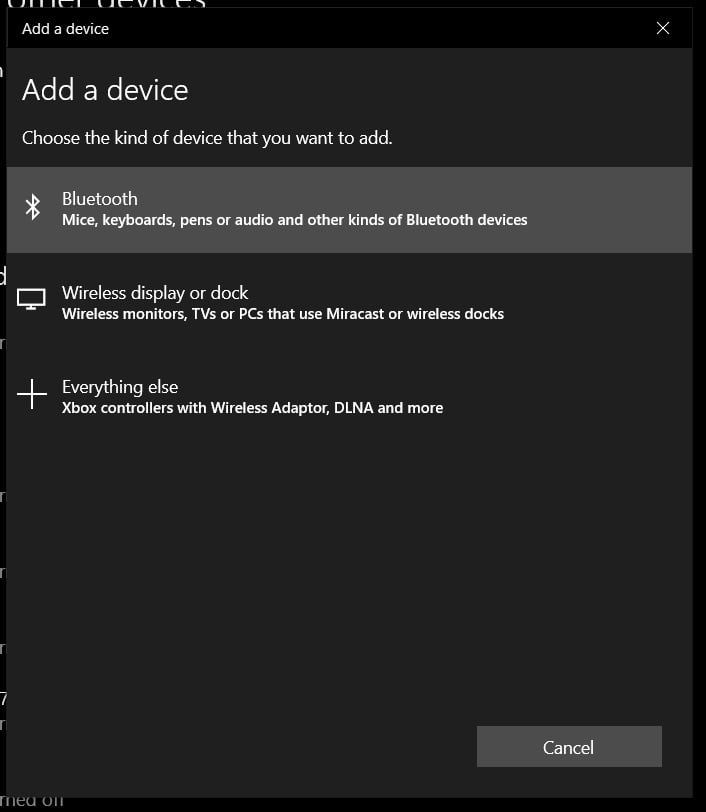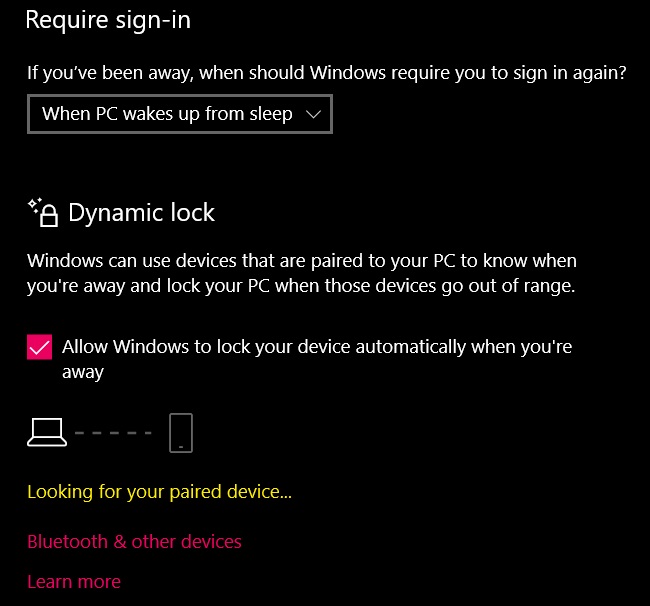How To Configure Windows Dynamic Lock With Your iPhone
Windows Dynamic Lock is a neat feature in the Windows 10 Creators Update that smartly protects your data by recognizing when you are near your computer and when you are away. The way this works is that it pairs itself with your mobile phone and recognizes the distance at which you are located through a running Bluetooth connection. If your mobile phone goes beyond a distance of 6 feet from the computer, the functional algorithm automatically locks your PC to protect the privacy of your system and data.
If you are out in public and happen to walk away from your computer to go somewhere else, forgetting to lock it, this feature will safeguard your system until you are back to unlock it directly yourself. Let’s suppose you are sitting and working at a Starbucks and you decide to get up and fetch your order, your PC will automatically lock behind you if you take your mobile phone with you. Once you get back, you can unlock your PC and resume working. This feature relies on your mobile phone being with you when you get up and leave. As the chances of this are quite high as most people commonly instinctively take their mobile phones with them or keep them in their pockets, Microsoft chose to use this metric to dictate a person’s location for the dynamic lock.
In the past, configuring a smart Microsoft Windows feature with a phone other than a Windows one was not possible. Eventually, they introduced support for Android phones as well. Supporting an iPhone would have been the toughest bet, but Windows has now come around to supporting it too and the Microsoft Windows and Apple MacOS/iOS divide has now been bridged in this functionality.
Step 1: Check For The Windows Creators Update
To go about setting up the Windows Dynamic Lock feature, you will first need to ensure that you are running the Windows 10 Creators Update as the feature is only updated in that version. To go about doing this, you will need to hover over your start button at the bottom left of your screen and then right-click on it. A context menu will show up. In this, menu if you are able to spot a “Settings” option, this means that you have got the Creators Update installed. It is an unusually peculiar way of checking, but it gets the job done.
Step 2: Pair Your Mobile Phone With Your Windows PC

Once you’ve confirmed that the Creators Update is running on your Windows PC, you will need to pair your mobile phone with your device over a Bluetooth connection. To do this, you will first need to turn Bluetooth on both of your devices: your mobile phone as well as your Windows PC. On your Windows PC, you will need to head into Settings > Bluetooth & other devices and toggle the Bluetooth. Similarly, you will need to head into your Bluetooth settings on your iPhone and toggle it from there. On your iPhone, also head into the “Personal Hotspot” setting and toggle that on as well. This is needed for the PC to detect your iPhone as a pairable smartphone device.
To pair the two devices, head into the Bluetooth & other devices settings on your Windows PC. Click on the plus icon at the top beside “Add Bluetooth or other device.” A Bluetooth configuration window ill pop up. Click on the first option at the top of the pop up that reads “Bluetooth” and specifies “mice, keyboards, pens, or other kinds of Bluetooth devices.”

Ensuring that your iPhone is in range and detectable via Bluetooth, find it in the list of devices that pops up and click to pair. If your iPhone does not appear, toggle its Bluetooth off and back on again. A pairing PIN will appear on both devices. Ensure that this PIN matches. Once you’ve cross-checked, click on the “Pair” button on your iPhone and the “Connect” button on your Windows PC. The two devices will then communicate and complete the pairing process. Once you close the new device pairing dialogue box, in the main “Bluetooth & other devices” settings page, you should be able to see your iPhone showing up as one of the pairing configured devices towards the bottom of the page. A phone icon should appear beside it to show that your PC has recognized it as a cellphone device (which is how you will need it to be recognized for the purpose of the dynamic lock feature).
Step 3: Enable The Windows Dynamic Lock Feature

Once you have paired your phone and your PC, you are then ready to configure the Windows Dynamic Lock feature. To do this, head into your PC’s settings and into the Sign-in options. Underneath Pin and Picture Password, you should notice a Dynamic lock section. There will be a checkbox next to the statement “Allow Windows to detect when you’re away and automatically lock the device.” Check this box and close the settings panel.
To test whether the connection has been configured properly, while your laptop is switched on and unlocked, stand up and walk away from your PC while keeping your mobile phone on your person (perhaps, leave the room). Walk back and check to see if the computer has been locked. The lock is almost instant once you cross the 6-foot mark and should automatically lock your PC when you’re away. If the lock did not occur, try walking a greater distance away or revisit your settings to ensure that your mobile phone is paired correctly and that the checkbox under Dynamic lock is checked too.
Final Thoughts
The Windows Dynamic Lock is a very cool and useful feature to have enabled so that you never have to worry about your data being exposed when you suddenly or carelessly get up and walk away from your computer. It keeps track of your distance from your screen using the Bluetooth connection on your mobile phone, locking your screen after you cross a distance of 6 feet or leave the room (where there is a wall obstruction in between). Previously, Microsoft kept these features exclusive to its Windows phones but these features are now open to Android and iPhones as well, the latter of which was perhaps the most groundbreaking collaboration given the operating system integration rift maintained between the two by both companies.





